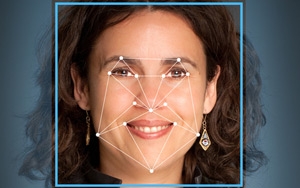Google Wants To Take ‘Faceprint’ Battle To Appellate Court
Google Wants To Take ‘Faceprint’ Battle To Appellate Court
by Wendy Davis @wendyndavis, March 10, 2017

Google is asking U.S. District Court Judge Edmond Chang for permission to immediately appeal his refusal to dismiss a class-action lawsuit accusing the company of violating an Illinois privacy law.
Chang’s ruling, issued last week, allowed Illinois residents Lindabeth Rivera and Joseph Weiss to move forward with class-action complaints accusing Google of running afoul of the Illinois Biometric Information Privacy Act by allegedly deploying facial recognition technology on photos uploaded by users.
Rivera said in her complaint that she doesn’t have a Google Photos account, but that photos of her were uploaded to the service after they were taken by someone else. Google then allegedly scanned the photos, extracted “geometric data relating to the contours of her face and the distances between her eyes, nose, and ears,” and created a template of her face. Weiss alleged that he uploaded 21 photos of himself to his Google Photos account, and that Google used data from those photos to create a faceprint of him.
The Illinois Biometric Privacy Information Act, passed in 2008, requires companies to obtain written releases from people before collecting certain biometric data, including fingerprints, voiceprints and scans of face geometry.
But the law also specifically excludes “photos” from the definition of “biometric identifiers, and excludes information derived from photos from a separate definition of “biometric information.”
Google argued to Chang that those exclusions required dismissing the case, arguing that Illinois lawmakers didn’t intend to regulate faceprints that were created from photos. Chang rejected that position, ruling that the law covers “scans of facial geometry” regardless of how they are created.
“The bottom line is that a ‘biometric identifier’ is not the underlying medium itself, or a way of taking measurements, but instead is a set of measurements of a specified physical component (eye, finger, voice, hand, face) used to identify a person,” he wrote.
Google now says that questions about whether the Illinois law covers faceprints created from photos should be decided by the Seventh Circuit Court of Appeals.
“If the Seventh Circuit agrees with Google’s reading of BIPA, that will be the end of the case,” Google says in its motion.
The company adds that even if the appeals court affirms Chang’s ruling, an appellate decision “may clarify the meaning of ‘biometric identifier’ in a manner that focuses discovery and trial preparation, and therefore helps the parties and the court resolve this litigation as efficiently as possible.”
Counsel for Rivera and Weiss is expected to respond to Google’s motion by March 30.
MediaPost.com: Search Marketing Daily
(77)












